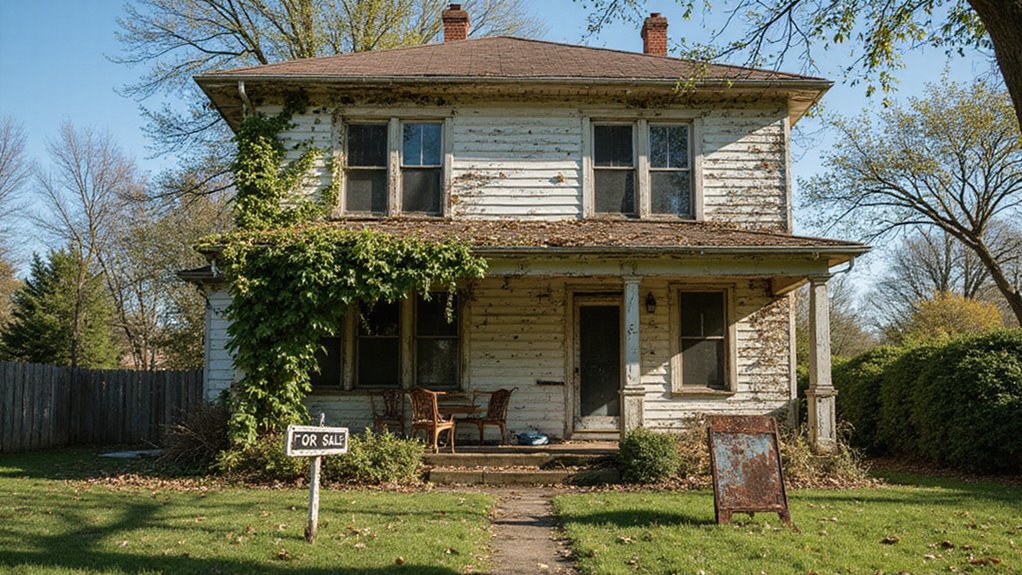Inheriting a house brings a mix of emotions and complex challenges. Many heirs face unexpected tax bills, maintenance costs, and legal paperwork they weren’t prepared for.
The pressure to sell quickly can feel overwhelming, especially when dealing with family dynamics or property disputes.
Time is critical when selling an inherited house. Every month of delay means more mortgage payments, property taxes, and maintenance expenses. Market conditions can shift rapidly, potentially affecting the final sale price and your profits.
The fastest way to sell an inherited house is to price it competitively, handle legal requirements early, and consider cash buyers or real estate investors. A clear strategy helps avoid costly mistakes.
Professional help from realtors and attorneys can streamline the process and maximize your returns. This guide outlines practical steps to sell your inherited property quickly while avoiding common pitfalls and legal complications.
Key Takeaways
- Verify clear ownership and resolve any legal or probate issues before listing the property.
- Prepare the house by repairing, decluttering, staging, and taking professional photos to attract buyers.
- Choose a quick-selling method like working with cash buyers, investors, or auctioning the property.
- Coordinate with all co-heirs and obtain necessary approvals to avoid delays during the sale process.
- Ensure proper legal documentation and clear title verification to facilitate a smooth and fast transaction.
What is an Inherited Property?

Inherited property means any real estate you receive after someone’s death. You can get this property through a will or trust. Family members usually pass down these properties to their relatives.
Properties can transfer through different methods like joint ownership or Transfer on Death deeds. Some properties need to go through probate court. Others might transfer to you right away without legal processes.
The property title must be clear before you can fully claim ownership. You should check for any existing liens or disputes. If problems exist, you may need legal help to resolve them.
Quick action helps protect your rights as a new property owner. You must decide whether to keep, sell, or rent the inherited property. Working with a real estate lawyer can make the process easier.
What are the Initial Steps After Inheriting a House
You must determine how you own the inherited house first. The house could be yours through sole ownership, joint tenancy, trust, or transfer-on-death deed. Your ownership type will affect taxes and legal requirements.
The property needs immediate protection through insurance and security measures. You should contact a real estate attorney to guide the inheritance process. If probate is necessary, file the required documents with your local court.
Review the ownership details in this table:
| Ownership Type | Action Required |
|---|---|
| Sole ownership | File for probate if needed, secure and insure property |
| Joint tenancy | Confirm rights, communicate with co-owners |
| Trust | Follow trust instructions, no probate needed |
| Transfer on Death | Verify deed’s validity, proceed with sale or transfer |
Financial responsibilities come next. You must pay property taxes, utilities, and maintenance costs. If the house has a mortgage, contact the lender. The inherited property may need repairs or updates before any decisions.
How to Sell an Inherited Property

You need to confirm who owns the property outright before moving forward; unclear titles or co-ownership can block sales. Talk to any co-heirs now to agree on your next steps—they’ll need to be on the same page. Then, evaluate the property’s condition and market value so you can choose the best way to sell and get it ready for the market.
Verify Legal Ownership
Legal ownership must be confirmed before selling inherited property. The property title will show current ownership status and potential disputes. You should examine all title documents carefully.
Probate records contain important details about property inheritance and estate distribution. Court documents will confirm if multiple heirs have claims. Estate papers can reveal any existing liens or outstanding debts.
If ownership issues arise, they must be resolved immediately. Multiple heirs might need to agree on the sale terms. Problems with title clarity could stop potential buyers.
Clear property titles make sales proceed smoothly and quickly. Title companies will check all documentation before approving transactions. Legal verification now prevents costly problems during the sale process.
Discuss with Co-Heirs (if applicable)
Co-heirs must agree on selling inherited property together. You should contact all heirs immediately after deciding to sell. A mediator can help if co-heirs disagree about the sale.
Clear communication prevents future legal problems with co-heirs. Each heir should state their expectations about the property sale. Written records of all discussions will protect everyone’s interests. The group should set realistic timelines for decisions.
Professional help might be necessary for complex inheritance cases. A lawyer can explain legal rights to all co-heirs. An estate agent can provide accurate property valuations. These experts will ensure fair treatment for everyone involved.
| Step | Action | Tip |
|---|---|---|
| Initiate Conversation | Contact all heirs | Be respectful and transparent |
| Clarify Interests | Discuss sale options, roles | Focus on shared goals |
| Resolve Conflicts | Mediate disagreements | Keep communication open |
Money discussions often cause tension between co-heirs. If conflicts arise, schedule separate meetings with each heir. Professional mediators can resolve difficult situations. Quick resolution saves time and money for everyone.
Assess the Property’s Condition and Value
Property inspection and value assessment are essential steps before selling inherited land. A professional inspector can identify repairs, damage, and potential safety issues. Current market analysis will reveal local prices and buyer demand.
You should evaluate if property upgrades would increase the sale value significantly. Simple improvements could attract more potential buyers. If the repairs are too costly, selling the property as-is might be better.
An accurate property valuation helps set the right asking price. Overpriced properties often stay longer on the market and lose buyer interest. Underpriced properties might lead to financial losses.
The assessment results will strengthen your position during negotiations. You can make informed decisions about price adjustments and repair requests. Quick action on these evaluations will speed up the selling process.
Choose How to Sell
You need to decide how to sell your inherited property quickly and effectively, but your options aren’t one-size-fits-all. You can list with a realtor for a traditional sale, sell directly to a cash buyer or investor for a faster deal, or consider auctioning the estate to attract competitive bids. Each method has its risks and benefits—choose wisely to maximize your return and avoid legal complications.
Traditional listing with a realtor
Listing with a realtor offers a proven path to sell inherited property quickly. A realtor handles marketing, showings, and price negotiations. Professional guidance helps navigate complex real estate transactions.
The selling process requires clear property titles and complete legal paperwork. If ownership records have issues, the sale could face delays. Legal problems might decrease property value over time.
Sellers must pay standard commission fees to realtors for their services. Most realtors charge between 5% to 6% of the final sale price. These fees cover marketing costs and the agent’s expertise throughout the sale.
Cash home buyer / investor
A cash home buyer purchases properties directly with available funds. These buyers skip traditional mortgage approval processes. Selling to them reduces paperwork and closing time.
Investors often accept properties in their current condition without repairs. They can close deals within days or weeks. Most investors handle all transaction paperwork themselves.
Inherited properties can benefit from cash buyer solutions. The process may bypass lengthy probate requirements. If you need quick funds, cash buyers provide immediate solutions.
You should verify the buyer’s credentials before accepting any offers. Professional investors will show proof of funds upfront. Working with reputable cash buyers ensures a safe transaction.
Auction or estate sale
Auctions and estate sales provide quick solutions for selling inherited property. These methods ensure fast transactions with ready buyers. Professional auctioneers handle the entire selling process efficiently.
The auction process offers clear advantages for sellers. Buyers must compete, which often leads to better prices. Cash payments arrive quickly after the sale. The transparent bidding system prevents disputes later.
Estate sales work well for selling entire household contents. Professionals will organize, price, and display items properly. If you choose this option, expect a three-day sale period. The house should be clean and organized before the sale begins.
Success depends on proper preparation and timing. Spring and fall typically attract more buyers to both formats. A clear property title will speed up the closing process. Working with licensed professionals ensures legal compliance throughout the sale.
Prepare and Market the Property (if listing)
Property preparation is essential before listing in the market. You should repair damaged items and deep clean every room. Professional staging will showcase your property’s best features.
The right pricing strategy starts with an accurate property valuation. A real estate agent can help determine competitive market prices. If the price is too high, potential buyers might overlook your property.
Remove personal items and declutter all spaces to create an inviting atmosphere. Fix any visible problems like leaky faucets or cracked tiles. Consider fresh paint and basic landscaping to boost curb appeal.
Professional photography will capture your property’s best angles and features. High-quality photos attract more potential buyers online. If possible, include virtual tours to increase buyer interest.
Quick action increases your chances of selling at the desired price. Market your property through multiple channels to reach more buyers. A well-prepared home typically sells faster than poorly maintained properties.
Finalize the Sale
Finalizing a property sale requires proper documentation and legal steps. You must verify the title is clear before proceeding. The transaction needs approval from all involved heirs.
Legal ownership must be established through a will or probate court. Heirs should reach an agreement on the sale terms. If disputes arise, a partition action may become necessary.
Tax obligations need careful attention during inherited property sales. The IRS requires specific forms for reporting such transactions. The stepped-up basis rules can affect your capital gains calculation.
Quick action helps avoid unnecessary expenses and complications. A real estate attorney can guide you through complex legal requirements. Professional help ensures compliance with all state and federal regulations.
How to Prepare the Inherited House for Sale
Before listing the inherited house, you need to clear out personal belongings quickly—this is often required by probate and essential for showing the property. Next, address necessary repairs and renovations to boost its appeal and market value. Finally, consider staging and marketing strategies to attract buyers fast and secure a hassle-free sale.
Clearing Out Personal Belongings
Clearing out belongings from an inherited house requires a systematic approach to sort and remove items. Personal items must be organized into groups based on their importance. You should complete this task within a reasonable timeframe.
The first step involves separating everyday items from meaningful possessions. Family members should decide which items hold sentimental value. If multiple heirs are involved, they must agree on the distribution of valuable items.
| Personal Belongings | Sentimental Items |
|---|---|
| Remove furniture | Decide what to keep or donate |
| Dispose of trash | Pack meaningful keepsakes |
| Clear closets | Store or sell valuables |
| Donate usable items | Respect family memories |
| Seal or secure items | Manage emotional attachments |
Furniture and household items can go to donation centers or second-hand stores. Valuable antiques might need professional appraisal before sale. Items in good condition could benefit local charities.
Personal documents and photographs need careful sorting and storage. Each family member should receive copies of important family records. Digital scanning can preserve memories while reducing physical storage needs.
Necessary Repairs and Renovations
Repairs and renovations must target key areas to make your house ready for sale. A well-maintained home attracts more buyers. Smart improvements will increase your property’s value.
Major repairs should focus on plumbing, electrical systems, and structural elements first. Buyers often walk away from houses with these problems. If left unaddressed, these issues could reduce your final selling price.
Paint, landscaping, and minor cosmetic fixes offer great returns on investment. Simple upgrades can dramatically improve your home’s curb appeal. These changes won’t break your budget but will attract potential buyers.
Time matters when preparing your house for sale. Quick repairs can reduce ongoing maintenance costs. If you delay necessary work, you might miss interested buyers.
Staging Tips for Quick Sale
Good staging helps sell houses faster. Your home needs proper presentation to attract potential buyers. Simple changes can make spaces more appealing.
Thorough cleaning makes a strong first impression. Buyers should see spotless floors, windows, and surfaces. Remove excess furniture and personal belongings. Empty closets and storage areas halfway.
Natural light creates welcoming spaces for visitors. Open all curtains and blinds during showings. Fresh paint in neutral colors works best. If walls need touch-ups, choose beige or gray shades.
Small repairs matter when selling a property. Fix leaky faucets, squeaky doors, and damaged trim. Update old light fixtures and cabinet hardware. Clean or replace worn carpets.
Decor should remain minimal yet tasteful. Fresh flowers add life to main living areas. Arranged furniture should allow easy movement through rooms. Clear pathways help buyers explore comfortably.
Need a Quick, Hassle-Free Sale? Contact House Max Today!
House Max buys inherited properties fast and without complications. We make fair cash offers on houses with title issues or co-heir disputes. Our team handles all paperwork and legal processes.
Title issues and probate delays can slow down property sales significantly. We specialize in resolving complex title problems quickly. Our experts guide sellers through each step of probate. If legal documents need clearing, we manage that process.
Estate taxes and inheritance complications shouldn’t stop you from selling. Our market knowledge ensures competitive offers for your property. We work directly with attorneys to speed up transactions. If co-heirs disagree, we help find solutions.

Hi, I’m Jason Jones, founder of House Max here in Kansas City. I’ve been in real estate for many years, starting in mortgages and later moving into investing and creative financing. Since 2012, I’ve been helping homeowners sell their houses quickly—whether they’re downsizing, relocating, or facing unexpected situations. Being born and raised in Kansas City gives me the local expertise to guide every transaction with integrity and care. My goal is always to make selling your house simple, fast, and stress-free.







